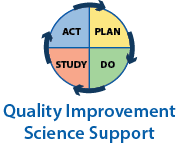Perinatal Quality Collaboratives: Working Together to Improve Maternal Outcomes
Overview
Perinatal Quality Collaboratives (PQCs) serve an important role, providing infrastructure that supports quality improvement efforts addressing obstetric care and outcomes. State-based PQCs partner with hospitals, providers, nurses, patients, public health, and other stakeholders to provide opportunities for collaborative learning, rapid response data, and quality improvement science support to achieve systems-level change.



PQCs have contributed to important changes in healthcare and led to significant improvements in maternal and infant outcomes. For example:
The Illinois Perinatal Quality Collaborative improved timely treatment for women with severe high blood pressure, increasing the percentage of patients treated within 60 minutes from 41% at baseline to 79% in the first year of the project.
The Northern New England Perinatal Quality Improvement Network improved care for women with opioid use disorder, increasing access to the lifesaving medication naloxone (11% to 36%) and breastfeeding counseling (51% to 72%) over a 13-month time period.
The California Maternal Quality Care Collaborative reduced serious pregnancy complications among women with severe bleeding during pregnancy or delivery, decreasing rates by 22.7% at baseline to 18.0% in the last half of the 14-month project.







CDC is currently providing support for 36 state-based PQCs and for the National Network of Perinatal Quality Collaboratives.
Given the urgent challenges facing maternal and newborn health across the country, there is an important role for PQCs nationwide.
- PQCs can adapt and address critical current and emergent perinatal health issues facing our nation.

- CDC will continue to support strong science that demonstrates the impact of using a collaborative population-based approach to improve the quality of care for our nation’s moms and babies.

- As state maternal mortality review committees (MMRCs) develop clinical recommendations to improve maternal outcomes, PQCs will be a key partner in implementing recommendations more broadly across health facility networks.

For more information, visit CDC’s PQC webpage and read Advances in Maternal Fetal Medicine – Perinatal Quality Collaboratives: Working Together to Improve Maternal Outcomes.